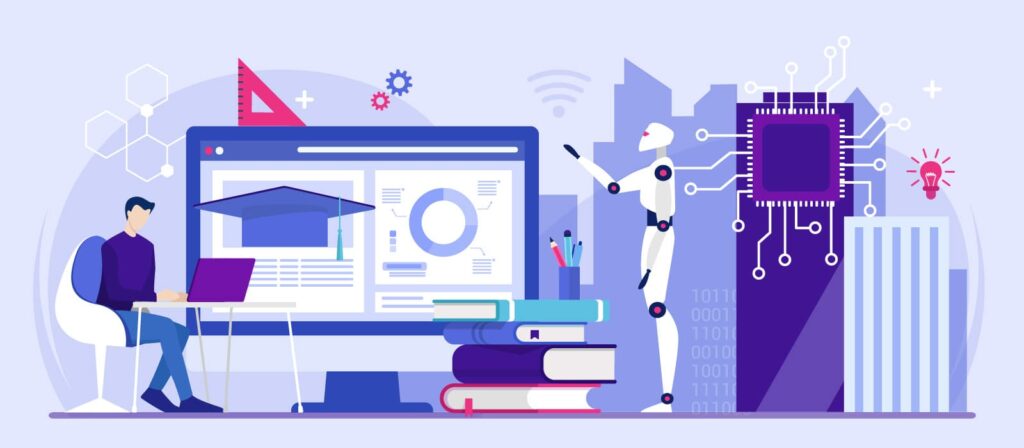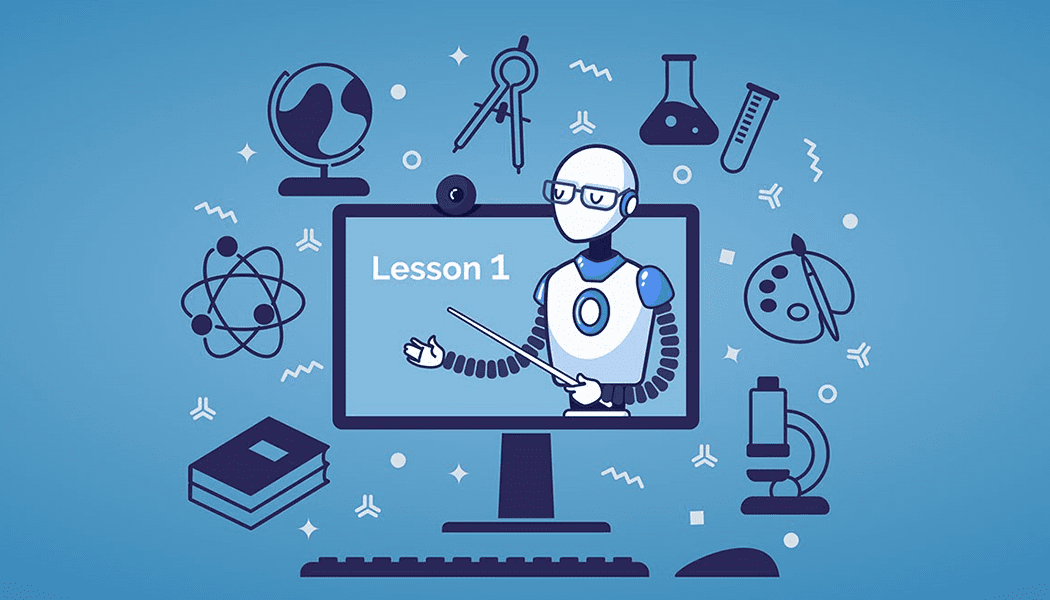In an era where technology permeates every aspect of our lives, the question, “Will AI replace teachers?” is more relevant than ever. Advancements in artificial intelligence (AI) are making significant strides nowadays. Hence, it’s natural for educators to feel apprehensive about their future roles.
Questions like- “Is it OK to use AI in teaching methods?”; “Should we rely upon artificial intelligence for educating children?; “Will AI create unemployment in the education sector?” etc. often come up.
This blog aims to delve into this concern. It will examine the current scenario of AI in education and discuss whether AI can replace teachers.
The Current Scenario of AI in Education
AI’s integration into education is no longer a futuristic concept. It’s already here. AI is transforming the educational landscape from personalized learning platforms to automated grading systems. With this, a sense of insecurity hovers around regarding the requirement of human teachers.
However, as experts affirm, this transformation doesn’t spell doom for teachers. Instead, it offers many tools to assist and enhance the teaching process.
Let’s look at the AI tools you can use as a teacher to enhance the efficacy of the education system.
Personalized Learning:
AI-driven edTech platforms use algorithms to tailor learning experiences to individual students’ needs. This personalized approach helps address learning gaps and provides students with content suited to their pace and level.
While discussing the use of AI in education, Gaspard Twagirayezu, Rwanda’s Minister of Education, underscored the value of personalized learning. He mentioned, “AI has the potential to assess the ability of individual students and then be able to customize content for them to learn.”
Automated Grading:
Teachers often spend countless hours grading assignments and tests. AI can take over this repetitive task, providing instant feedback to students. Thus, it can free teachers to focus on more critical aspects of education, like curriculum development and one-on-one student interactions. Rose Luckin, a professor of Learner-Centered Design at UCL Knowledge Lab, affirms this.
Administrative Tasks Tracker and Manager:
Moreover, AI can handle administrative duties like scheduling, tracking attendance, and answering routine questions from students and parents. This automation reduces the administrative burden on teachers, allowing them to dedicate more time to teaching and engaging with students.
The Role of AI in Teaching:
AI’s role in education isn’t about replacing teachers but augmenting their capabilities. Here’s how AI can support teachers.

Provides Enhanced Teaching Resources:
AI can help create dynamic and interactive teaching materials. For instance, virtual reality (VR) and augmented reality (AR) can bring historical events to life or simulate scientific experiments, making learning more engaging and effective. Justin Reich, an Assistant Professor at MIT and director of the Teaching Systems Lab, explains this in his book “Failure to Disrupt: Why Technology Alone Can’t Transform Education.”
Data-Driven Insights:
AI can analyze vast amounts of data to provide insights into student performance, identifying patterns and predicting outcomes. So, teachers can use this information to intervene early when a student is struggling or to tailor their teaching methods to better suit their class’s needs.
Professional Development:
AI can also assist teachers in their professional growth. Platforms offering AI-driven professional development programs can suggest courses and resources based on teachers’ skills and career goals. Thus, they help them to stay updated with the latest educational trends and techniques.
Will AI Replace Teachers: A Discussion
Well, AI indeed holds immense capabilities to bring a wave of transformation in the education industry. However, it lacks the human touch that is crucial in education. Here are several reasons why AI will not replace teachers:
Emotional Intelligence:
Teaching is not just about imparting knowledge. It’s also about understanding and addressing students’ emotional and psychological needs. AI lacks the empathy and emotional intelligence for it. So, you need human teachers to build meaningful relationships and foster a supportive learning environment.
Creativity and Critical Thinking:
Teachers inspire creativity and critical thinking, skills that are hard for AI to replicate. Human teachers can encourage students to think outside the box, ask questions, and engage in debates. Also, they help students perform activities fundamental to holistic education. As Sir Anthony Seldon, Vice-Chancellor of the University of Buckingham, emphasizes it.
Ethical and Moral Guidance:
Teachers often serve as role models, providing ethical and moral guidance. They help shape students’ values and character, something AI, with its lack of personal experience and moral compass, cannot do.
Adaptability and Flexibility:
Education is not a one-size-fits-all process. Teachers adapt their teaching styles based on the dynamics of their classrooms, the unique needs of their students, and the evolving educational landscape. AI, despite its adaptability, cannot match the nuanced understanding and flexibility of a human teacher.
How AI Empowers Teachers: Learn the Details
Instead of viewing AI as a threat, teachers should see it as a powerful ally. Here’s how AI can empower educators:
Efficiency in Task Management:
By automating routine tasks, AI allows teachers to focus on what they do best—teaching. This increased efficiency means more time for lesson planning, student interaction, and professional development.
Innovative Teaching Methods:
AI introduces new and innovative teaching methods. Tools like intelligent tutoring systems can support students outside of classroom hours, ensuring they receive the help they need to succeed.
Continuous Feedback and Improvement:
AI can offer continuous feedback on both student and teacher performance. This feedback loop helps teachers identify areas for improvement and implement changes more effectively.
Accessibility and Inclusivity:
AI can help make education more accessible to students with disabilities. For example, AI-powered tools can convert text to speech, provide real-time subtitles, or translate content into different languages. Thus, they ensure that all students have equal access to learning materials.

FAQs
1. Will AI replace teachers entirely?
No, AI will not replace teachers. While AI can handle certain tasks and provide support, the role of a teacher encompasses much more than what AI can achieve, including emotional support, ethical guidance, and fostering creativity.
2. How can teachers benefit from AI in the classroom?
Teachers can benefit from AI by using it to automate administrative tasks, personalize learning for students, and access data-driven insights to improve their teaching strategies. This allows teachers to focus more on interacting with and supporting their students.
3. What are some AI tools currently used in education?
Some AI tools used in education include personalized learning platforms, automated grading systems, and virtual teaching assistants, which provide real-time support to students.
4. Can AI adapt to different teaching styles and classroom dynamics?
While AI can adapt to some extent through machine learning algorithms, it cannot fully replicate the nuanced understanding and flexibility of a human teacher. Teachers adjust their methods based on real-time feedback and the unique needs of their students, which AI cannot match entirely.
5. How can teachers prepare for the integration of AI in education?
Teachers can prepare for AI integration by staying informed about the latest AI tools and trends, participating in professional development programs, and experimenting with AI technologies in their classrooms to understand their potential benefits and limitations.
Final Words
So, AI has the potential to make teaching more efficient and innovative, thereby empowering teachers rather than rendering them obsolete.
The question, “Will AI replace teachers?” is a common concern among educators today. However, the evidence suggests that AI will not replace teachers but instead empower them. By automating routine tasks, providing personalized learning experiences, and offering data-driven insights, AI can enhance the teaching process and free up teachers to focus on what they do best—nurturing and educating students.
As AI continues to evolve, it is crucial for teachers to embrace these technological advancements and integrate them into their teaching strategies. Doing so will not only improve efficiency but also lead to more innovative and engaging learning experiences for students.
By understanding and leveraging AI tools, educators can enhance their teaching practices and continue to provide invaluable guidance and support to their students. So, what are you waiting for? Start exploring AI tools today and discover how they can transform your classroom for the better!

Comments 0